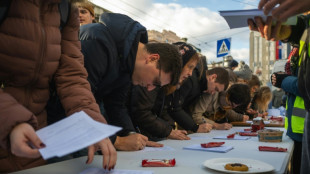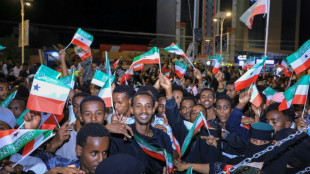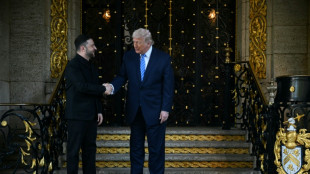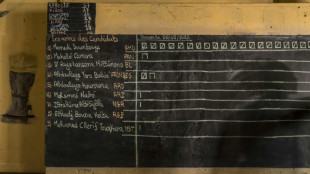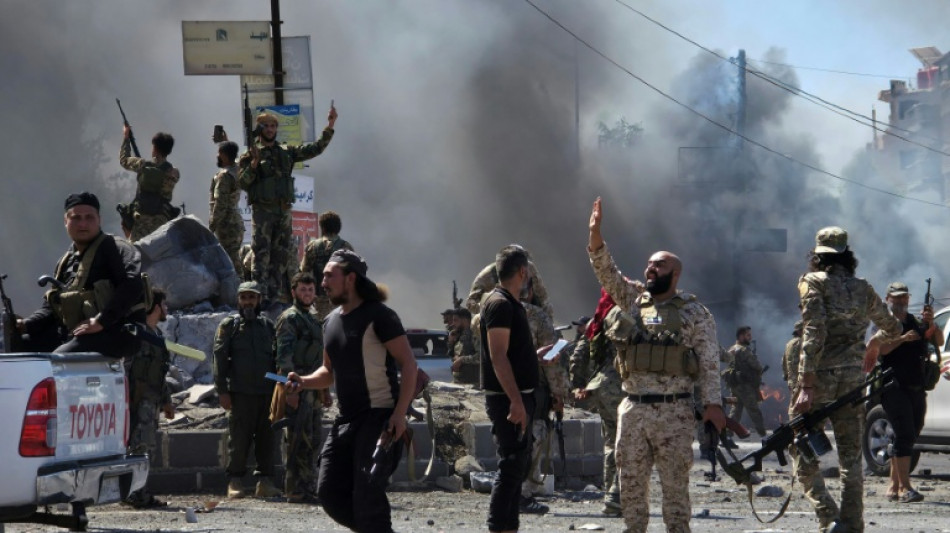
Israel strikes Syrian forces sent into Druze-majority Sweida

Israel launched strikes Tuesday against Syrian government forces in the Druze-majority region of Sweida, saying it was acting to protect the religious minority.
Damascus had deployed troops to Sweida after clashes between Druze fighters and Bedouin tribes killed more than 100 people.
Israel announced its strikes shortly after Syria's defence minister declared a ceasefire in Sweida city, with government forces having entered the city in the morning.
While most Druze religious leaders supported the deployment, at least one senior figure called for armed resistance.
"Prime Minister Benjamin Netanyahu and Defence Minister Israel Katz have instructed the Israeli military to immediately strike regime forces and weaponry that were brought into the Sweida region... in order to carry out operations against the Druze," a joint statement said.
"We are acting to prevent the Syrian regime from harming them and to ensure the demilitarisation of the area adjacent to our border with Syria," it added.
In a statement shortly after, the Israeli military said it had begun hitting military vehicles in the area. Syrian state media also reported strikes.
Israel, which has its own Druze population, has sought to portray itself as a defender of the minority group since the overthrow of longtime president Bashar al-Assad in December.
It also says it will not allow a Syrian military presence south of Damascus. Analysts, however, say Israel is using the Druze as a pretext for intervention.
Damascus, which recently entered diplomatic talks with Israel, did not immediately comment on the strikes.
- 'Complete ceasefire' -
"To all units operating within the city of Sweida, we declare a complete ceasefire after an agreement with the city's notables and dignitaries," Defence Minister Murhaf Abu Qasra posted on X shortly before midday (0900 GMT).
"We will respond only to sources of fire and deal with any targeting by outlaw groups," he added.
Druze representatives gathered at the residence of key leader Sheikh Youssef Jarbouh to discuss implementing the ceasefire, a source close to the participants said.
An AFP correspondent at a city entrance said gunfire subsided after the ceasefire announcement. A photographer saw government troops waving the Syrian flag atop a roundabout.
They had earlier reported clashes as government forces entered the city, with Druze spiritual leaders having sent conflicting messages before their arrival.
Most had welcomed the deployment, but the influential Sheikh Hikmat al-Hijri changed his stance and called in a statement for "resisting this brutal campaign by all available means".
A curfew was to be imposed on the southern city in a bid to halt the violence, which erupted at the weekend and has since spread across Sweida governorate.
The defence ministry urged people to "stay home and report any movements of outlaw groups".
Abu Qasra said defence ministry units were undertaking "combing operations" in Sweida city and would hand the areas over to the forces of the interior ministry once they were completed.
Government forces said they intervened to separate the two sides but ended up taking control of several Druze areas around Sweida, an AFP correspondent reported.
Troops had begun heading towards the city on Monday, taking control of at least one Druze village, with one Druze faction saying talks were underway with the Damascus government.
The Syrian Observatory for Human Rights war monitor earlier reported 116 people killed since the fighting erupted on Sunday -- 64 Druze, including four civilians, as well as 52 members of the government forces and Bedouin tribes.
The defence ministry reported 18 deaths among the ranks of the armed forces.
- Druze-Bedouin feud -
The fighting underscores the challenges facing interim leader Ahmad al-Sharaa, whose Islamist forces ousted Assad after nearly 14 years of civil war.
Syria's pre-war Druze population was estimated at around 700,000, mostly concentrated in Sweida province. Followers of an esoteric offshoot of Shiite Islam, the Druze are primarily found in Syria, Lebanon and Israel.
Following deadly clashes with government forces in April and May, local and religious leaders reached an agreement with Damascus under which Druze fighters had been providing security in the province.
Amal, a 46-year-old woman, said: "We fear a repeat of the coastal scenario", referring to massacres in March of more than 1,700 mostly Alawite civilians in northwest Syria, where groups affiliated with the government were blamed for most of the killings.
"We are not against the state, but we are against surrendering our weapons without a state that treats everyone the same," she added.
The Observatory said members of Bedouin tribes, who are Sunni Muslims, had sided with security forces during earlier confrontations with the Druze.
Bedouin and Druze factions have a longstanding feud in Sweida, and violence occasionally erupts between the two sides.
N.Krupa--GL

 London
London

 Manchester
Manchester
 Glasgow
Glasgow
 Dublin
Dublin
 Belfast
Belfast
 Washington
Washington
 Denver
Denver
 Atlanta
Atlanta
 Dallas
Dallas
 Houston Texas
Houston Texas
 New Orleans
New Orleans
 El Paso
El Paso
 Phoenix
Phoenix
 Los Angeles
Los Angeles
